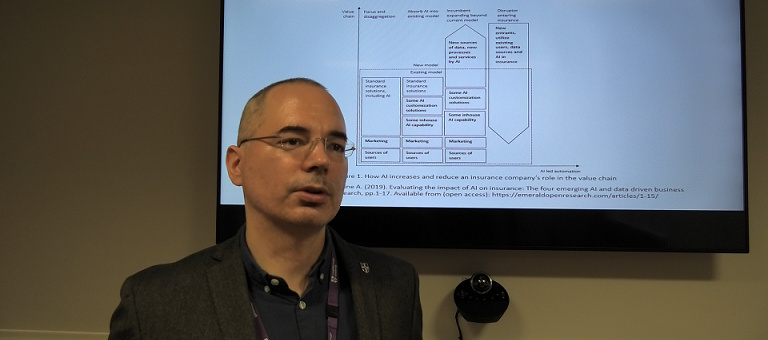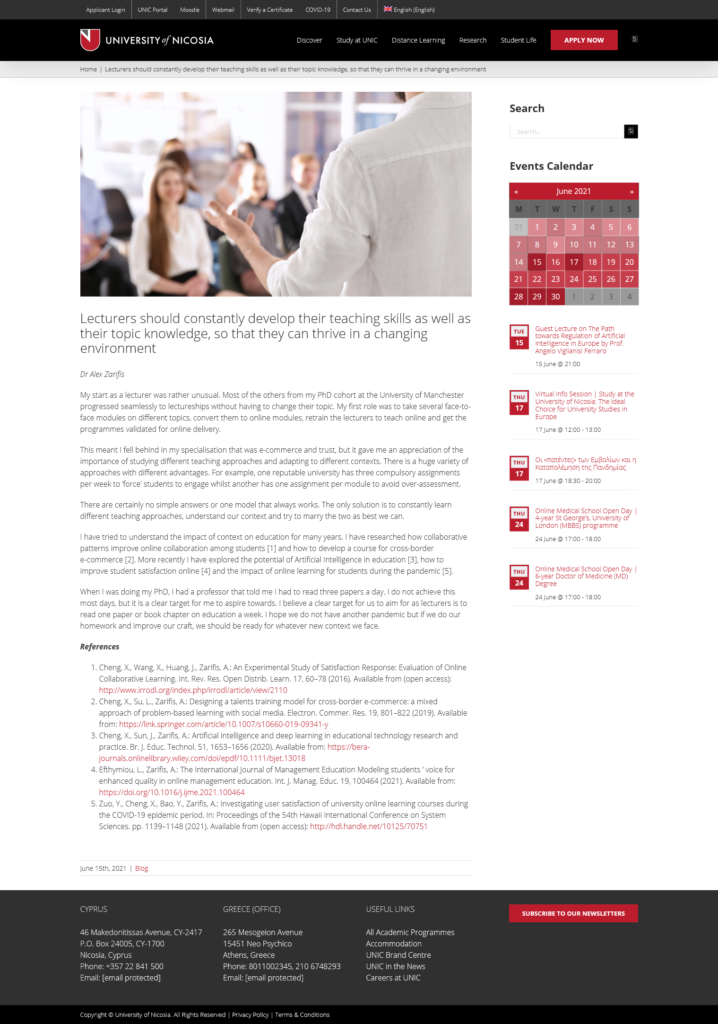Dr Alex Zarifis
My start as a lecturer was rather unusual. Most of the others from my PhD cohort at the University of Manchester progressed seamlessly to lectureships without having to change their topic. My first role was to take several face-to-face modules on different topics, convert them to online modules, retrain the lecturers to teach online and get the programmes validated for online delivery.
This meant I fell behind in my specialisation that was e-commerce and trust, but it gave me an appreciation of the importance of studying different teaching approaches and adapting to different contexts. There is a huge variety of approaches with different advantages. For example, one reputable university has three compulsory assignments per week to ‘force’ students to engage whilst another has one assignment per module to avoid over-assessment.
There are certainly no simple answers or one model that always works. The only solution is to constantly learn different teaching approaches, understand our context and try to marry the two as best we can.

I have tried to understand the impact of context on education for many years. I have researched how collaborative patterns improve online collaboration among students [1] and how to develop a course for cross-border e-commerce [2]. More recently I have explored the potential of Artificial Intelligence in education [3], how to improve student satisfaction online [4] and the impact of online learning for students during the pandemic [5].
When I was doing my PhD, I had a professor that told me I had to read three papers a day. I do not achieve this most days, but it is a clear target for me to aspire towards. I believe a clear target for us to aim for as lecturers is to read one paper or book chapter on education a week. I hope we do not have another pandemic but if we do our homework and improve our craft, we should be ready for whatever new context we face.
References
1. Cheng, X., Wang, X., Huang, J., & Zarifis, A. (2016) ‘An Experimental Study of Satisfaction Response: Evaluation of Online Collaborative Learning’, International Review of Research in Open and Distributed Learning, 17, 60–78. http://www.irrodl.org/index.php/irrodl/article/view/2110 (open access)
2. Cheng, X., Su, L. & Zarifis, A. (2019) ‘Designing a talents training model for cross-border e-commerce: a mixed approach of problem-based learning with social media’, Electronic Commerce Research, 19, 801–822. https://link.springer.com/article/10.1007/s10660-019-09341-y
3. Cheng, X., Sun, J., Zarifis, A. (2020) ‘Artificial intelligence and deep learning in educational technology research and practice’, British Journal of Educational Technology, 51, 1653–1656 . https://bera-journals.onlinelibrary.wiley.com/doi/epdf/10.1111/bjet.13018
4. Efthymiou, L., Zarifis, A. (2021) ‘The International Journal of Management Education Modeling students ’ voice for enhanced quality in online management education’, The International Journal of Management Education, 19, 100464. https://doi.org/10.1016/j.ijme.2021.100464
5. Zuo, Y., Cheng, X., Bao, Y., Zarifis, A. (2021) Investigating user satisfaction of university online learning courses during the COVID-19 epidemic period. In: Proceedings of the 54th Hawaii International Conference on System Sciences. pp. 1139–1148 . http://hdl.handle.net/10125/70751 (open access)
Thank you to the University of Nicosia, especially Chara Zymara and Kasiani Pari, for featuring my article:
